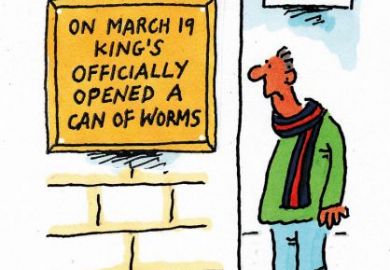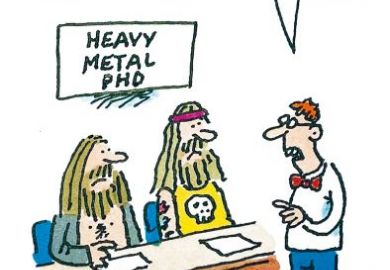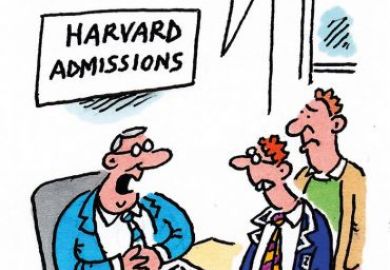
The costs of travelling to open days are dictating some disadvantaged students’ choice of university, according to a 9 July report on the BBC News website. Thousands of teenagers are currently criss-crossing the country to visit universities where they might study. But with a return trip by train from north to south often costing £200 to £300, the costs are limiting some students’ options. West Midlands Railway has responded, the BBC reported on 13 July, by offering to provide free travel to the University of Worcester this autumn. Ross Renton, pro vice-chancellor at Worcester, welcomed the rail firm’s offer and said it would “help make travel costs less prohibitive” for students and their families who wished to visit the university. That just leaves the problems of UK rail travel for every other would-be student and every other rail user to solve.
Former England striker, long-term Match of the Day presenter, prolific tweeter and ardent anti-Brexit campaigner Gary Lineker has been named a visiting fellow at Lady Margaret Hall, Oxford. He was one of nine new visiting fellows announced by LMH for 2019-22, with actress Emma Watson being appointed an associate fellow. Alan Rusbridger, principal of LMH, said: “We can learn much from them, and we hope they treasure their time with us.” But ardent pro-Brexit campaigner Toby Young, whose stint as appointee to the board of the Office for Students lasted just eight days after previous offensive comments came to light, was less than impressed with the appointment. Mr Lineker’s qualifications for “this new honorarium remain unclear”, Mr Young wrote in The Spectator on 18 July, suggesting that perhaps the 48-goal England legend will just entertain students with anecdotes from his career, such as the time he “defecated on the pitch” during the 1990 World Cup. Jovial Mr Lineker shot back on Twitter: “Let’s hope I last longer than you did on the board of the Office for Students.” With Mr Lineker’s tweet receiving 2,300 “likes” compared with 143 for Mr Young’s tweet of a link to the article, no penalty shoot-out was required to determine the winner of this clash.
Why do the US’ community colleges not receive the attention they deserve? Google might be part of the explanation. Inside Higher Ed reported on 19 July that as of last year, Google has been adding information about universities to its search results, “meaning that a search for a college now automatically pulls up data, much of it from the federal government, on the institution’s selectivity, tuition, graduation rates, student loan repayment rates and expected earnings”. However, the website’s report noted that an article by Jason Delisle and Cody Christensen of the American Enterprise Institute has highlighted how community colleges and for-profit institutions are presented like any other business on Google search, rather than as institutions of higher education. “Google’s search-display magic is reserved for students interested in just one part of our higher education sector – the one that mostly caters to traditional, full-time students seeking academic credentials who are often from upper-income households,” the thinktank staffers wrote.
For many, the phrase “student accommodation” evokes memories of piles of pizza boxes and mould in the bathroom. But there are luxury alternatives if you can afford them, as Metro reported on 16 July. One student hall in Glasgow includes a giant slide to convey residents from the first floor to the ground floor, as well as an indoor festival zone featuring a music caravan. Other student residences boast roof terraces, a party room with a sound system, DJ booth and dance floor, grand pianos and games rooms. “Millennial pink velvet seating and lush green hanging plants” all sound a long way from a smelly sofa in a terraced house at the tatty end of a British city – but it all must be rather profitable for the accommodation providers benefiting from the free ad in Metro.
A “major review” of university admissions has been announced by Universities UK, following a “comprehensive” review into the same subject being ordered by the Westminster government, it was announced on 22 July. The reviews come amid concern over so-called “conditional unconditional” offers, while it is also suggested that the reviews could pave the way for the introduction of post-qualification applications. UUK’s “fair admissions review” has an advisory group led by Paddy Nixon, vice-chancellor of Ulster University, and including several other vice-chancellors and school and college leaders, along with the Ucas chief executive, Clare Marchant. But the acting general secretary of the University and College Union, Paul Cottrell, said the “review panel has missed a trick by not including any staff directly involved in making offers, or any students who have recently been through the university admissions process”.
Register to continue
Why register?
- Registration is free and only takes a moment
- Once registered, you can read 3 articles a month
- Sign up for our newsletter
Subscribe
Or subscribe for unlimited access to:
- Unlimited access to news, views, insights & reviews
- Digital editions
- Digital access to THE’s university and college rankings analysis
Already registered or a current subscriber? Login



